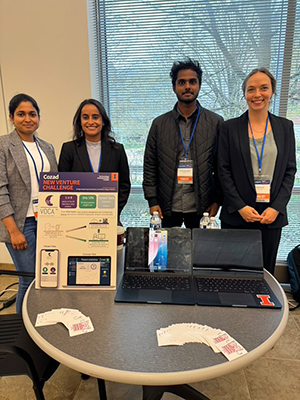
May 27, 2025 Business Administration Entrepreneurship Student
Gies MBA student part of leadership team for a Cozad finalist startup

Lakshmi Priya Rangaraju is helping VOCA Health develop a business strategy for a voice disorder management app.
The Cozad New Venture Challenge wrapped up its 25th anniversary competition on April 17. Of the 308 University of Illinois startups competing for more than $500,000 in funding, only six were invited to present at the finals. Lakshmi Priya Rangaraju, who will complete her MBA from Gies College of Business this year, leads the business operations for one of those finalists, VOCA Health. The startup is building a voice disorder management tool for ENT and speech pathology clinicians and patients. Gies Business is one of Cozad’s presenting sponsors of the 2025 event, which saw 57 Gies-led teams compete, up from just seven in 2024.
Illinois has a reputation for interdisciplinary research. One of those examples is Carle Illinois College of Medicine’s (CICOM) student capstone project, which invites students from Gies Business to join a CICOM innovative startup which addresses a pressing need in healthcare. Rangaraju joined VOCA through one of those capstone projects in 2024 and has provided business and marketing expertise over the last year in preparation for another run at Cozad and the rollout of its prototype.
Rangaraju completed her undergraduate degree in India and earned a master’s in bioengineering from the University of Illinois Chicago. Her bioengineering degree gave Rangaraju a unique perspective in helping VOCA create a business strategy.
“It certainly helped in the communication piece,” she said of her background. “I was able to understand the technical jargon. I can wear both hats, so to speak.”
It’s not uncommon for singers, teachers, broadcasters, and others who use their voice often to seek out speech pathologists for disorders they develop. Once a diagnosis is made, the experts prescribe exercises and therapy to address the symptoms but currently don’t have a way to follow their patients' progress in between visits. That is the gap that VOCA is trying to fill.
“One of the common problems is in the follow-up,” Rangaraju said. “VOCA will give physicians and patients a tool to communicate with each other, to evaluate how well the treatment is going, and whether the condition is improving. The patient is given a set of exercises to do and records those exercises. We are developing a proprietary algorithm that evaluates and analyzes their voices to see how well they are progressing. If they are not, they might need another in-person visit, or a treatment might be modified.”
In seeking an MBA, Rangaraju said she chose the Gies Business fully online iMBA program because of its flexibility, affordability, and quality of education.
“The courses I have taken here have helped me shape the business plan, develop the marketing strategy, and position the company in the marketplace,” she said.
In a year on its team, Rangaraju helped in the initial discovery phase. In that time VOCA rounded out its business, engineering, and software development teams. In the coming months, VOCA plans to add some advisors and officially form a company.
“My focus has been identifying what is important for customers and developing a strategy for getting the product in the hands of those who need it, and the business model to make it profitable for us or make it attractive for venture capitalists,” she said.
Rangaraju indicates that the primary customers are physicians and will target Carle and Yale New Haven Hospitals as early adopters.
“We ultimately want the app to be the preferred prescribed therapeutic tool,” she said.
According to Rangaraju, in addition to funding, Cozad has provided VOCA with valuable mentorship and brought the startup to a stage where it is starting to think like a full-fledged company. VOCA’s next steps are finishing modeling the prototype and beta testing with a couple of teachers and singers. They will also turn to doctors and professors to get feedback on the user interface.
“We might have a good idea, but at the end of the day, we need to develop a final product and get it to the market and convince people that this is worth investing in,” she said. “There currently isn’t an app that is as comprehensive and fully addresses this problem that VOCA is solving. It might seem like a very niche dilemma, but I think that’s because many people are not aware of it. The app has the potential to help identify a problem and to be a long-term solution.”
